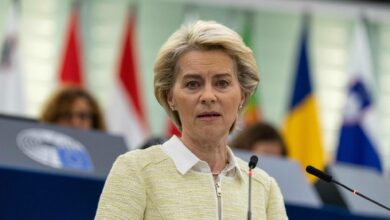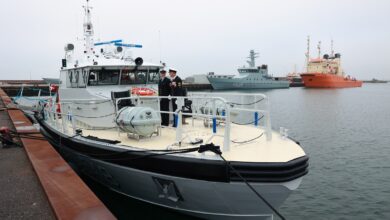Some work is being undertaken within European Union institutions to enable the creation of a dedicated defense directorate with a Commissioner to lead a push for more effective military planning and spending, sources have told AFP.
Brussels plans to spend around €13 billion on defense capabilities and research over its next long-term budget as it seeks to boost resilience and reduce Europe’s reliance on the U.S. for protection.
The defense portfolio is currently handled by Federica Mogherini, the E.U.’s High Representative for Foreign Affairs and Security Policy and head of the European External Action Service, but she will leave office later this year when the current European Commission’s mandate ends.
The sources said the incoming team could include a dedicated defense commissioner.
“Reflections are under way within the institutions for the creation of a directorate general in charge of security and defense issues,” French defense minister Florence Parly said last month.
France has been at the forefront of the E.U. defense push. In August 2018, President Emmanuel Macron suggested that Europe should adopt a NATO-style collective defense to give the E.U. ‘strategic autonomy’, and a year earlier, Macron called for the formation of a European defense fund.
Several sources in E.U. institutions told AFP that “the means have been identified to create a defense directorate general for a commissioner, if this is the mandate given to the next president” of the commission, the union’s powerful executive.
The new commission is not due to be in place until November and officials say that for now nothing has been decided.
“The decision rests with the next commission president and the agreement of the member states is required, because defense is a national competence,” explained a European official.
Another cautioned: “There are a lot of ideas but it’s complex and in the end it’s possible that nothing will happen.”

European Defense Fund
The E.U.’s next seven-year budget has €20 billion earmarked for defense overall.
That spending includes €13 billion for the European Defence Fund to cover the E.U.’s 2021-2027 financial period, proposed by the Commission last June and approved by the Parliament earlier this month.
The EDF sets aside €4.1 billion for research and €8.9 billion for developing military capabilities. Only collaborative projects involving at least three member states or associated countries can receive funding.
The Commission said the funding will “place the E.U. among the top four defense research and technology investors in Europe, and act as a catalyst for an innovative and competitive industrial and scientific base.”
Brussels officials are keen to stress that the money is for industry and research, and not to raise the kind of “E.U. army” that has been a bugbear for eurosceptics in particular in several member countries, as well as in neutral Ireland.
Parly also pointed out that, in E.U. terms, €13 billion over seven years is a relatively small sum, and pales into insignificance compared with the U.S., which spends nearly $700 billion on defence every year.
“This corresponds to the annual amount of investment devoted by France for its military equipment,” Parly said. “But this is huge for the EU, because we are starting from scratch.”

EU tensions with the United States
The drive to increase European defense funding has caused some tensions with Washington, where officials fear U.S. defense companies may be shut out of E.U. projects.
France, Germany, Italy and Spain – the E.U.’s leading defence equipment producers once the U.K. leaves the union – have launched joint projects to produce drones and combat planes “so that they are no longer dependent on the capabilities of the U.S.,” Parly explained.
Some countries in eastern Europe, on the other hand, have been pushing to use the funding to upgrade their ageing military industries in the hope of being better able to integrate with U.S.-led forces.
Parly insisted there was “no question of turning our backs on NATO.”
“But how can we be reliable as allies if we keep calling for help?” she said.
The debate over how to use the new funding may be ongoing, but “the money will soon be there, and someone will be needed to manage it,” a European official pointed out, with Parly pleading for “full-fledged leadership”.
Creating a Commissioner post would respond to this request, Poland’s Elżbieta Bieńkowska, the E.U.’s Industry Commissioner said.
She argues that managing the EDF should stay within the Commission, which is responsible for managing the E.U.’s common budget.

EU reluctance
But defense has long been a jealously guarded sovereign power and E.U. member states are reluctant to hand it over to the commission.
Mogherini herself is also reluctant. Her team manages the E.U.’s defence cooperation pact, known as PESCO.
Launched in December 2017, the Permanent Structured Cooperation on security and defense (PESCO) which 25 member states have joined allows participating states to develop joint defense capabilities, invest in shared projects, and enhance the operational readiness and contribution of their armed forces.
Last June, six E.U. member states declared their intent to create cyber rapid response teams, a project led by Lithuania, one of 17 PESCO projects announced so far. Others include the establishment of a European medical command, E.U. training mission competence center, military disaster relief and an upgrade of maritime surveillance.
“Allowing a directorate-general for defense to be set up behind the back of the European External Action Service is like agreeing to have your pocket picked,” a European diplomat explained.
“Creating a Commissioner to manage a €13 billion budget is not justified. On the other hand, if its competences are extended to cybersecurity and the military aspects of satellite programmes, it makes more sense,” a European official said.
There are a number of other proposed or implemented European defense initiatives.
In June 2018, nine E.U. states signed up to a French plan for a European defense intervention group, including the United Kingdom which backs the measure as a way to maintain strong security ties with the bloc after Brexit.
The same month, the Mogherini proposed a new €10.5 billion ($12.4 billion) “peace facility” that could pay for military equipment, including lethal weaponry, for partner countries in crisis zones such as Africa’s Sahel region.
With reporting from AFP












